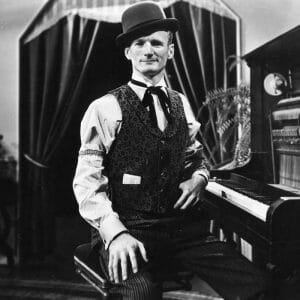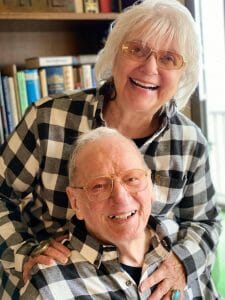Born in Colorado Springs, Colo., Morath’s mother was a pianist who played for silent films. Max followed in mom’s footsteps, studying piano and harmony. Though, he said, “I never studied seriously, and some music critics have agreed.” After graduating college (in English), he spent a little time traveling around Colorado as a musical director and pianist for Melodramas. Some were recorded, and released as his first records. Not surprisingly, his musical specialty was ragtime, and he voraciously studied its history and players, drawing inspiration from George and Ira Gershwin, Irving Berlin, and his heroes, Eubie Blake and Scott Joplin. Along the way he earned the nickname “Mr. Ragtime”.

Morath moved on to TV and radio, writing, performing, and co-producing a 26-episode series The Ragtime Era for National Educational Television, the precursor to PBS, which ran 1959-1961. The 1970s brought a revival of ragtime, and he was given credit for helping to make it happen. “The person who kept rag alive almost single-handedly during all the dark years was really Max Morath,” gushed composer Eric Salzman, writing in Stereo Review. Morath wanted to be clear: “People think of ragtime as piano music. But there is a body of work in the ragtime vein written for banjo and for alto sax. That’s because Rudy Wiedoft, the saxophonist, and Harry Reser and Fred Van Eps, who played banjo, were virtuosos who didn’t play piano but were exposed to ragtime.”

Morath explained his financial success this way: “Whatever you do in New York, you make no money unless you’re a star. But if I go to Hastings, Neb., I can make $3,500 in a night. You work New York to get notices so that you can play in Des Moines. All my professional life, I’ve made a good living out there.” In 1982, he noted “I travel small. I tour with just a stage manager in a Mercedes diesel. Posh? Not the way we use it. We ripped out the back seat. We carried 200 pounds of sound equipment, a prop or two and 200 or 300 records that I sell at the concerts.” In 1969, his off-Broadway one-man show Max Morath at the Turn of the Century did well, but did even better touring the country for the next four years. Several other productions followed, such as The Ragtime Years, Living a Ragtime Life, and The Ragtime Man. Morath retired from touring in 2007, but continued to lecture and do musical consulting work. He and his wife retired to Duluth, Minn., and he died there on June 19, at 96.
Video Below: Morath plays 15 minutes of his ragtime hits in a 1984 TV appearance.
